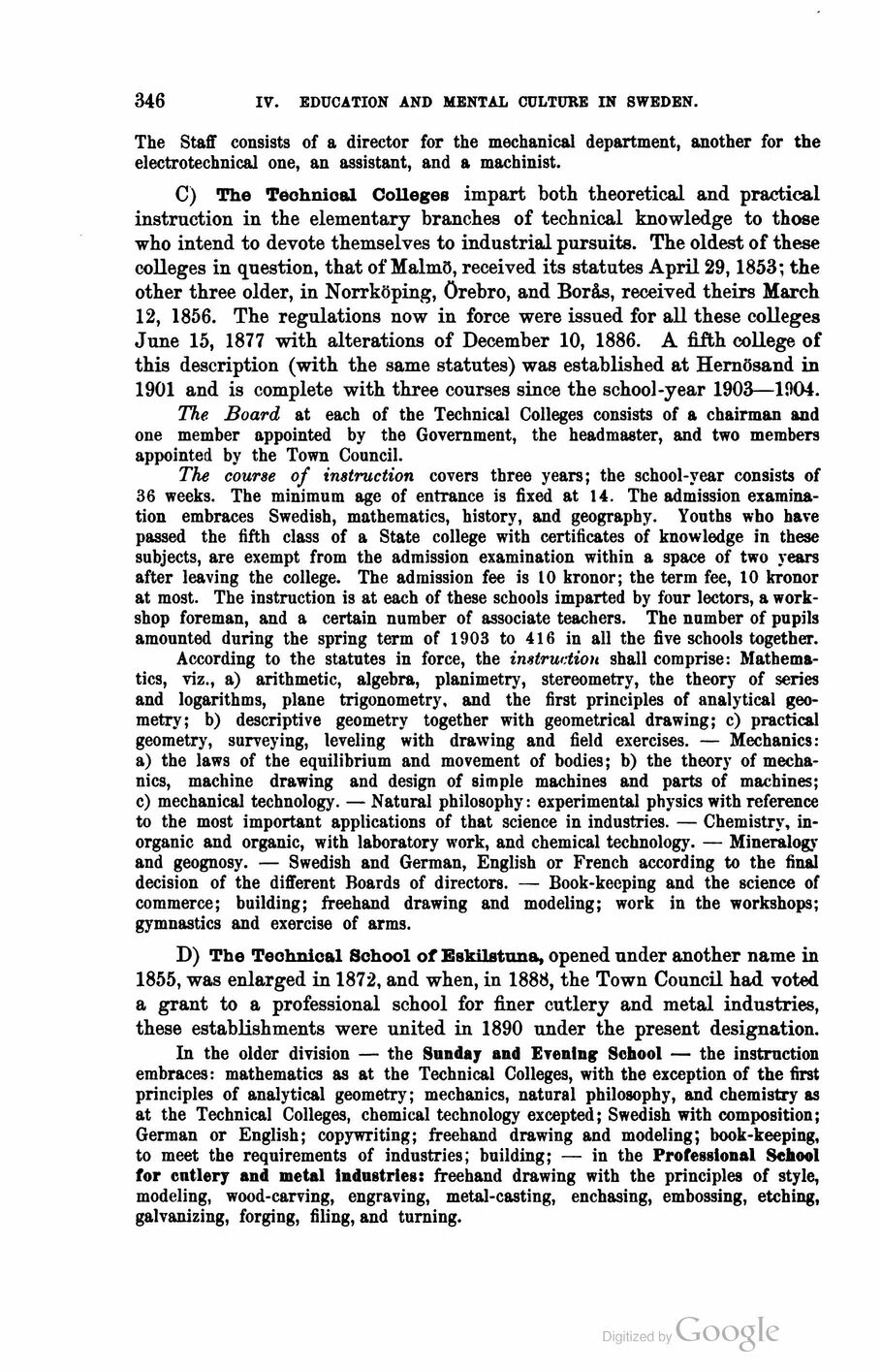
Full resolution (JPEG) - On this page / på denna sida - First part - IV. Education and Mental Culture - 4. Technical Education. By Lector A. Söderblom, Ph. D., Chalmers' Polytechnical College, Gothenburg - B) Chalmers' Polytechnical College - C) The Technical Colleges - D) The Technical School of Eskilstuna

<< prev. page << föreg. sida << >> nästa sida >> next page >>
Below is the raw OCR text
from the above scanned image.
Do you see an error? Proofread the page now!
Här nedan syns maskintolkade texten från faksimilbilden ovan.
Ser du något fel? Korrekturläs sidan nu!
This page has never been proofread. / Denna sida har aldrig korrekturlästs.
346
IV. EDUCATION AND MENTAL CULTURE IN SWEDEN.
The Staff consists of a director for the mechanical department, another for the
electrotechnical one, an assistant, and a machinist.
C) The Teohnioal Colleges impart both theoretical and practical
instruction in the elementary branches of technical knowledge to those
who intend to devote themselves to industrial pursuits. The oldest of these
colleges in question, that of Malmö, received its statutes April 29,1853; the
other three older, in Norrköping, Örebro, and Borås, received theirs March
12, 1856. The regulations now in force were issued for all these colleges
June 15, 1877 with alterations of December 10, 1886. A fifth college of
this description (with the same statutes) was established at Hernösand in
1901 and is complete with three courses since the school-year 1903—1004.
The Board at each of the Technical Colleges consists of a chairman and
one member appointed by the Government, the headmaster, and two members
appointed by the Town Council.
The course of instruction covers three years; the school-year consists of
36 weeks. The minimum age of entrance is fixed at 14. The admission
examination embraces Swedish, mathematics, history, and geography. Youths who have
passed the fifth class of a State college with certificates of knowledge in these
subjects, are exempt from the admission examination within a space of two years
after leaving the college. The admission fee is 10 kronor; the term fee, 10 kronor
at most. The instruction is at each of these schools imparted by four lectors, a
workshop foreman, and a certain number of associate teachers. The number of pupils
amounted during the spring term of 1903 to 416 in all the five schools together.
According to the statutes in force, the instruction shall comprise:
Mathematics, viz., a) arithmetic, algebra, planimetry, stereometry, the theory of series
and logarithms, plane trigonometry, and the first principles of analytical
geometry; b) descriptive geometry together with geometrical drawing; c) practical
geometry, surveying, leveling with drawing and field exercises. — Mechanics:
a) the laws of the equilibrium and movement of bodies; b) the theory of
mechanics, machine drawing and design of simple machines and parts of machines;
c) mechanical technology. — Natural philosophy: experimental physics with reference
to the most important applications of that science in industries. — Chemistry,
inorganic and organic, with laboratory work, and chemical technology. — Mineralogy
and geognosy. — Swedish and German, English or French according to the final
decision of the different Boards of directors. — Book-keeping and the science of
commerce; building; freehand drawing and modeling; work in the workshops;
gymnastics and exercise of arms.
D) The Technical School of Eskilstuna, opened under another name in
1855, was enlarged in 1872, and when, in 1888, the Town Council had voted
a grant to a professional school for finer cutlery and metal industries,
these establishments were united in 1890 under the present designation.
In the older division — the Sunday and Evening School — the instruction
embraces: mathematics as at the Technical Colleges, with the exception of the first
principles of analytical geometry; mechanics, natural philosophy, and chemistry as
at the Technical Colleges, chemical technology excepted; Swedish with composition;
German or English; copywriting; freehand drawing and modeling; book-keeping,
to meet the requirements of industries; building; — in the Professional School
for cntlery and metal industries: freehand drawing with the principles of style,
modeling, wood-carving, engraving, metal-casting, enchasing, embossing, etching,
galvanizing, forging, filing, and turning.
<< prev. page << föreg. sida << >> nästa sida >> next page >>